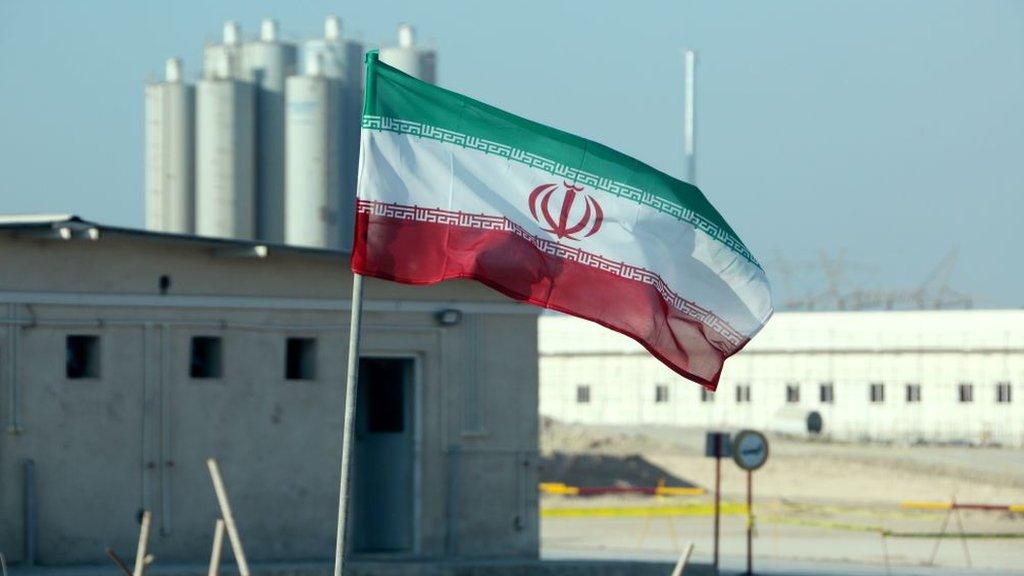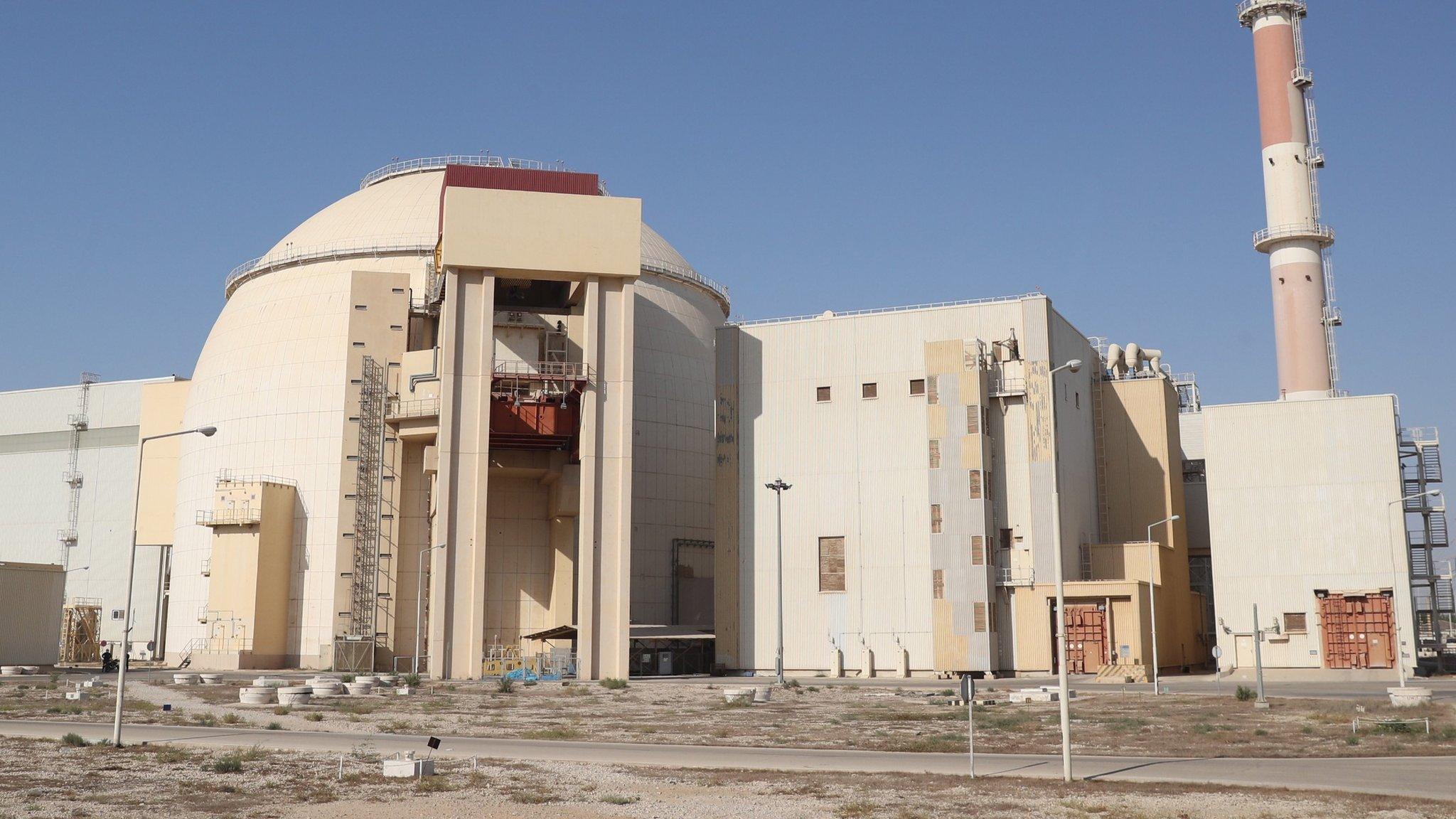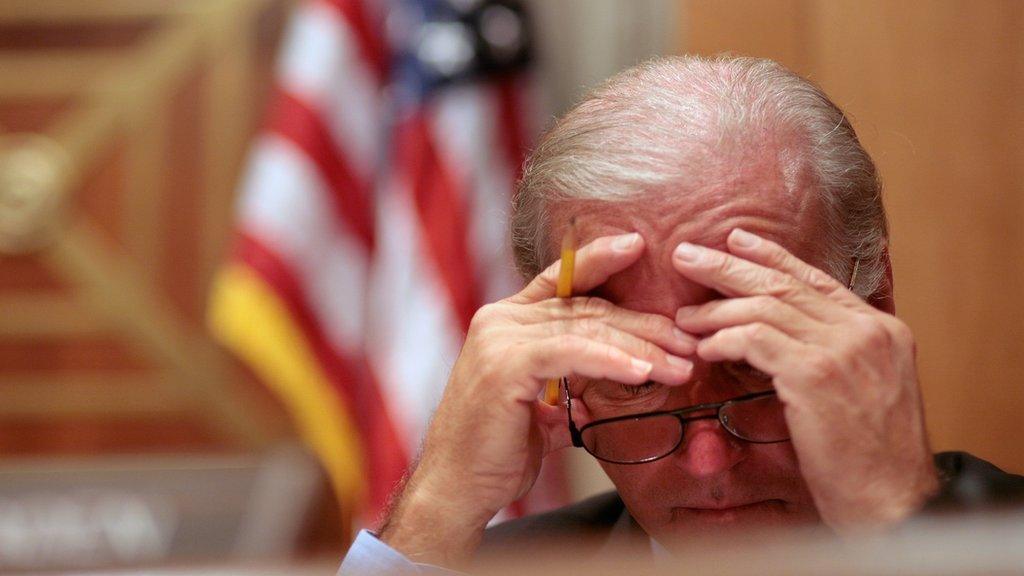Mohsen Fakhrizadeh assassination: How will Iran respond?
- Published
Mohsen Fakhrizadeh was buried in Tehran following his assassination on Friday
How will the Islamic Republic respond to last Friday's controversial killing of its top nuclear scientist?
Mohsen Fakhrizadeh was killed in a mysterious attack on a road outside the capital Tehran and on Monday he was given a state funeral with full military honours. No country or group has said they carried out the attack but Iran's leaders blame Israel and have vowed revenge.
So what are Iran's options for response and what are the constraints it faces?
Option one: accelerate the nuclear programme
Iran has already made its initial response. Within 72 hours of the attack its parliament approved an "acceleration" of its civil nuclear programme, increasing the level of uranium enrichment in contravention of the JCPOA nuclear deal which US President Donald Trump abandoned in 2018.
Mr Fakhrizadeh was not only a leading nuclear scientist, he had a senior role within the defence establishment, as evidenced by the number of military figures at his funeral.
Stepping up the nuclear programme is a way of showing defiance to the world, that Iran's nuclear activities can survive this assassination. While any increase in enrichment raises suspicions that Iran could be working towards building a nuclear bomb this measure is, to some extent, reversible.
Option two: use proxies
Iran has a number of "proxy" militias that it funds, trains and arms across the Middle East - in Lebanon, Iraq, Syria and Yemen.
The road near Tehran where gunmen opened fire on Mohsen Fakhrizadeh
When a barrage of drones and cruise missiles struck Saudi Arabia's oil processing infrastructure in September 2019 Iran maintained they were fired by Yemen's Houthi rebels, even though they came from the north. Western intelligence concluded this was an Iranian attack, launched as a warning to Saudi Arabia of just how much damage it could cause to the Saudi economy.
Iran now has a number of alternatives it could choose to activate in this sphere: it could instruct Hezbollah in Lebanon or Hamas in Gaza to fire rockets into Israel, it could get Shia militias in Iraq to attack the dwindling US presence there, or it could get Yemen's Houthis to increase their attacks on Saudi Arabia. Yet all of these in turn risk a counter-response.
Option three: respond in kind
This, for Iran, would be perhaps the riskiest course of all: attempting an assassination of a senior Israeli figure of similar standing to the late Mohsen Fakhrizadeh.
Iran has shown that it is capable of striking well beyond the borders of the Middle East. After a series of mysterious killings of four Iranian nuclear scientists in 2010-12, widely believed to have been carried out by Israel's Mossad intelligence agency, Iran's ally Hezbollah was blamed for a suicide bomb attack on a bus full of Israeli tourists in Bulgaria in 2012.
In 2018, Israeli PM Benjamin Netanyahu unveiled what he claimed to be Iran's secret atomic archive
Years earlier, Hezbollah and Iran were blamed for deadly attacks on Israeli interests in Argentina. More recently, Iranian agents in Europe were suspected of targeting dissidents.
Iran's Islamic Revolutionary Guards Corps Quds Force has teams specially trained in covert operations, including assassinations.
But the fact that Mr Fakhrizadeh's protective cordon so blatantly failed, with his assassins knowing his exact route and time of departure, will have been an uncomfortable reminder to Iran of the weaknesses within its own security.
Iran also knows that if it hits Israel directly then it's likely to suffer a highly damaging attack in response.
Israel is no longer a lonely, isolated state surrounded by Arab enemies. Today it is enjoying ever closer co-operation with the United Arab Emirates and Bahrain as well as warming, if still covert, ties with Saudi Arabia.
So Iran's military planners will be thinking carefully just how to calibrate a response that restores some national pride but without triggering a full-scale war or a devastating air strike on its military infrastructure.
Option four: do nothing
Unlikely as it sounds, this will be under consideration, at least for now. Although Iran's ambassador to London has always said the results of the US presidential election made no difference to his government, the fact is that a Biden administration is far more likely to want to reach a rapprochement with Tehran.
There will now be moderate voices, especially in the foreign ministry and business world, calling for restraint, or at least a delayed response, to give any future dealings with a Biden White House some chance of success.
President-elect Joe Biden has already said he wants to bring America back into the nuclear deal that President Trump abandoned. For Iran, that could mean the lifting of sanctions and the influx of billions of dollars.
"The main constraint," says Emile Hokayem of the International Institute for Strategic Studies, "is that if Iran lashes out then it risks being unable to do a deal with the incoming Biden administration."
Iran also has elections coming up in June, which the hardliners hope to do well in. Despite the noisy rhetoric, there will be some caution about setting off a process that could derail their chances at the ballot box.
- Published12 November 2020

- Published16 November 2021

- Published18 November 2020
